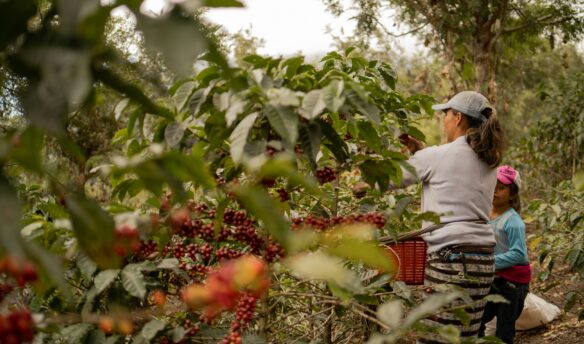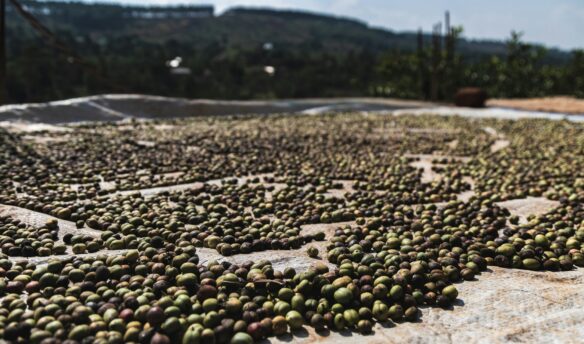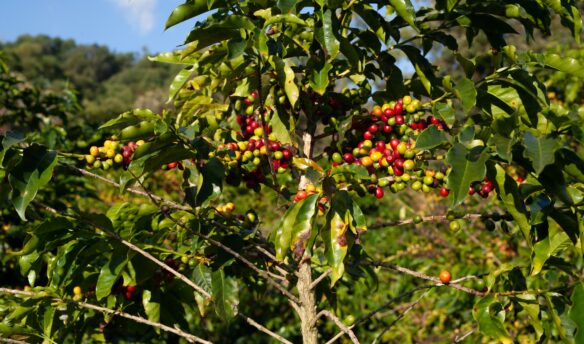Not the bees! Why syrup-heavy Dutch Bros Coffee has a pollinator problem. Plus, a coffee chain is opening franchises in high schools, and Stumptown becomes the latest company to ditch dairy.
📩 Get the latest coffee trends in your inbox weekly—subscribe here.
‘Why This Coffee Chain is Opening Stores in High Schools’ – via Fast Company
A small but growing number of high schools around the US are opening PJ’s Coffee franchises on their campuses, offering students “a modern-day version of the vocational training school—like a 21st-century shop class.”
Students handle every aspect of the business, from making coffee drinks to filing taxes. “They learn inventory, marketing, advertising, customer service, soft skills, and they learn how to make coffee,” said Jason St. Pierre, principal at Walker High School, which has hosted a PJ’s franchise for three years. “In essence we are training baristas in high school so they can go to work once they graduate from high school.”
PJ’s Coffee of New Orleans is a chain based primarily in the southern US, with 150 locations across 14 states. About half a dozen are housed within public and private high schools, which pay reduced franchise fees to set up.
PJ’s itself makes little money on these deals, as franchise development manager Tori Bermond points out. “At the end of the day, these are very low-volume stores, so we’re not making very much on royalties,” she says. “What matters to us is the learning component, and being able to provide these kids with options and the ability to learn these skills at a young age that they can then go implement at their first job or as their career.”
St. Pierre agrees: “We have to redesign high school,” he says. “Schools ought to be a conduit, from school to work or school to school, whatever you plan on doing.”
‘Sting Operation: Dutch Bros’ Bee Problem’ – via Phoenix Magazine
Welcome to one of the strangest stories this news roundup has ever covered.
Dutch Bros Coffee is a drive-thru coffee chain that has been on an expansion drive through the American West and went public in 2021. It is known for its friendly baristas and wide variety of sugary beverages—so well known, in fact, that many of the chain’s Phoenix stores have been overrun by bees.
It seems as if the bees are attracted to the artificially-flavored coffee syrups used to make drinks on the Dutch Bros menu. This story comes to us from Phoenix Magazine: it recounts the tale of Tulip Elmore, a Phoenix-based beekeeper who had an ongoing job finding, rescuing, and rehabilitating sick bees that had gorged themselves on syrup.
“Leaving the drive-thru windows open for extended periods of time and the sheer number of sugary drinks on their menu compared to other coffee shops with drive-thru windows was at the heart of the problem,” Elmore told Phoenix Magazine.
Elmore estimates that she’s “collected bees from 38 Dutch Bros coffee stands over a seven-year period … [and] rescued and relocated nearly 1,600 colonies and just shy of 32 million bees during that time.” Things changed in 2021 when the company went public and began questioning the company’s expenses—Elmore and her husband charged around $1,000 per stand every month to rescue and relocate bees. “There were new accountants who were like, ‘Why are we paying a beekeeper a quarter million dollars a year?'” Elmore said.
So what happens to the bees that feast on Dutch Bros coffee syrups?
[Elmore] says the bees were taking the syrup back to the hive and feeding it to the queen, who’d get hooked and sit around all day, not laying eggs or issuing royal orders. Moreover, her drones, hopped up on the syrup and obsessed with finding their next fix, stopped looking for things to pollinate. Essentially, they abandoned their basic housekeeping chores, infected with a spore-forming parasite called Nosema and sick with the bee equivalent of dysentery.
While the issue appears confined to Dutch Bros locations in Arizona, anecdotal reports have reported problems with bees in Nevada and the company’s home state of Oregon. It comes up on job review sites and Yelp, with one customer writing about a location in Tempe: “Dutch bros is great and the coffee is good. The employees were super nice as well. My only concern are the mother freakin’ bees! They were flying around everywhere in this location.”
The author of this piece found evidence of bees at several Dutch Bros locations and spoke with many baristas who acknowledged the issue. However, the company itself proved more challenging to pin down. After weeks of trying to contact someone at the company through emails and texts, Dutch Bros issued a tersely-worded statement saying, “We do our best to be responsive to issues surrounding bees and ensure we’re meeting the needs of our customers and crews. Thanks.”
Elmore was hurt but not surprised when her job was cut post-IPO. “I was never a big fan of their coffee,” she said. “But I used to brag that this company was humane and responsible because it cared about the environment. What happened?”
Read the full story here (it’s really worth your time).
More News
‘Latest IISD Coffee Report Calls for More Price Transparency’ – via Daily Coffee News
‘Delta Airlines Is Taking The Espresso Martini A Mile High’ – via Sprudge
‘You Can Spend $150 on a Cup of Coffee at Proud Mary, if That’s Something You’re Into’ – via Eater Portland
‘Espresso Parts Partners with Japan’s Kalita to Launch Kalita USA’ – via Daily Coffee News
‘ACE announces Best of Ka‘ū Hawaii PCA 2022’ – via Global Coffee Report
‘LAF Bar Pro Named Best New Product At World of Coffee Dubai’ – via Sprudge
‘Fairtrade Launches Humanitarian and Environmental Risk Map’ – via Daily Coffee News
The Week in Coffee Unionizing
- Workers at Peet’s Coffee in Davis, CA, have voted overwhelmingly to unionize. It’s a first for the 300-store chain, with workers taking advice from the Starbucks union to successfully organize their cafe. A second Davis location was due to hold an election but withdrew their petition amid allegations that the company offered employees $500 to withdraw support and “give Peet’s a chance.”
- Baristas at La Colombe’s Gold Coast store in Chicago voted unanimously to form a union, the first in the city to do so. “Regardless of who we are, where we come from, where we live and what we do, we all deserve to make enough money to live here,” one barista shared. “And that’s not happening.”
The Week in Corporate Coffeewashing
In 2022, Blue Bottle Coffee announced that it would use oat milk by default for milk-based drinks. The mini-chain, which originated in the Bay Area and now has over 100 locations across the globe, has inspired other brands to follow suit.
Stumptown, the Portland-based third-wave trailblazer, announced earlier this month that not only did they intend to switch their default milk option but that stores had already begun doing so. “Beginning this year,” an Instagram post from January 6th, 2023, reads, “all Stumptown cafés began serving oatmilk as the default in every milk-based drink.” (Stumptown uses the phrase ‘oatmilk,’ likely to avoid any litigation issues about what can technically be called milk).
More than half of Stumptown’s customers were already asking for oat, and the brand states they decided to shift to oatmilk as their default option for environmental reasons. Oat milk is indeed less harmful to the environment than dairy milk—a glass of cow’s milk creates at least three times more emissions than any non-dairy milk, and oat-based milks in particular produce less pollution than other dairy alternatives.
Here comes the but: Stumptown is owned via Peet’s by JDE Peet’s, a company with sales of $8 billion that produced the equivalent of 6.6 million tons of carbon dioxide in 2021. That number puts JDE Peet’s carbon emissions at the same level as East Timor, a country with 1.32 million people.
Stumptown partnered with Oatly to roll out its new oat-based menu; one of Oatly’s investors is Blackstone, a private equity firm with ties to deforestation in the Brazilian Amazon, among other questionable eco credentials.
The point here isn’t that Stumptown’s move is bad or that it’s not worth switching to alternative milk. Instead, it’s crucial to analyze announcements about environmental initiatives from big businesses carefully. Often, these easily-digestible soundbites conceal or deflect other not-so-friendly practices.
Beyond the Headlines
‘From Worker To Owner: Behind The Scenes At Three Coffee Roasting Cooperatives’ by Jenn Chen
‘Coffee Preferences Aren’t Universal. That’s a Good Thing.’ by Ashley Rodriguez















